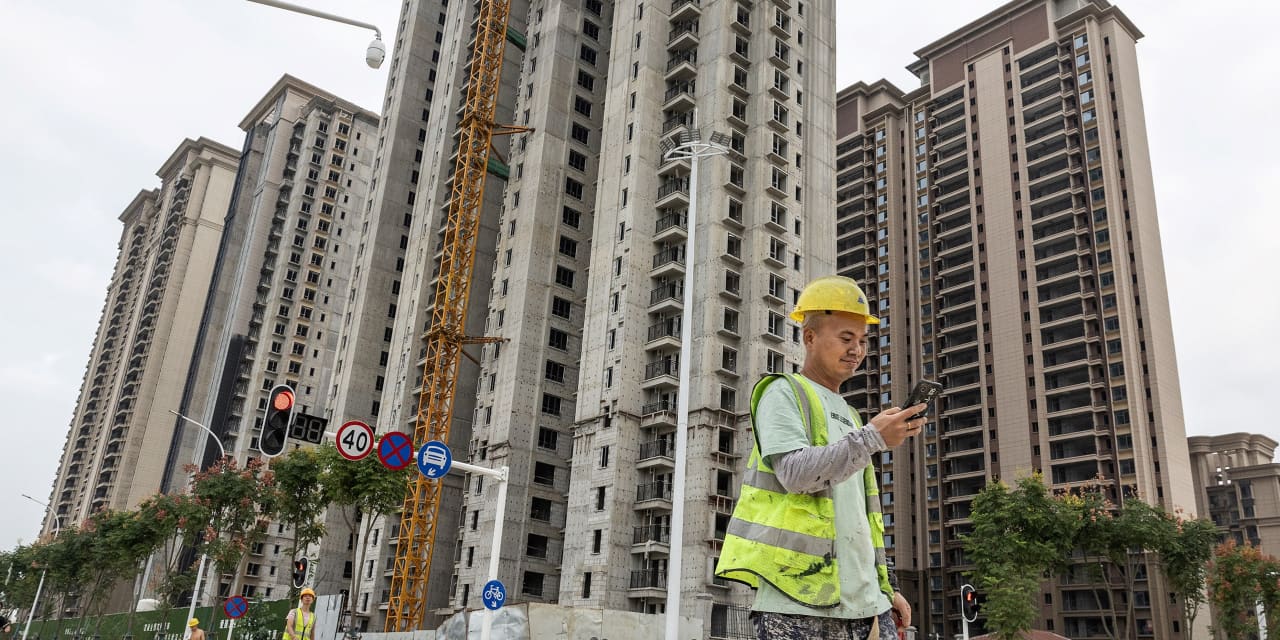Shanghai resident Li Wenming is a self-employed installer of blinds and screens for windows and doors. He said August and September are normally boom times for his services, as the Chinese southern city’s scorching temperatures cool and people keep their windows and doors open, thanks to protective screening.
But China’s seemingly immovable economic dark cloud—its property crisis—remains directly overhead. The sector has an outsize drag effect on a range of businesses, including small firms and services. As housing sales decline, so does the demand for furniture, renovation and interior decoration, and even services that new homes require such as hooking up internet and utilities.
Li’s services felt the effects of the steady decline in home sales. “I’m normally too busy to handle all my installation requests,” he said. “Some days in August I was working half-days.”
The sluggishness of China’s economy this year has lowered expectations so much that last week’s announcement that the economy expanded slightly in September above forecasts seemed like celebratory news among the media and the government.
The economy grew at 4.9% in the third quarter year-over-year, just beyond the 4.6% expected from a Reuters poll of economists. It grew 6.3% the quarter before.
Most areas of the economy were flat. But retail sales—a proxy for consumption—and services were bright spots. Both have long been areas China says it wants to transition its economic model toward, but Beijing continues to plow most stimulus measures into already bloated infrastructure development.
Home prices, though, fell again in September, reflecting a decline in demand. When asked what he planned to do if weak demand continued, Li said, “I don’t know. Many of my friends have become delivery drivers when their main jobs slowed or ended.”
Indeed, the demand for delivery and dining is robust compared with other consumer areas. “They don’t have half days,” Li said, referring to his busy delivery-driver friends.
But because property is a massive part of the Chinese economy and is where Chinese invest most of their savings, the crisis extends far beyond property-adjacent sectors like renovation or furniture.
“The National Day golden week tourism data, together with the still above-50 September services [purchasing managers indexes], suggest the services recovery has decelerated but continues,” Goldman Sachs analysts wrote in a recent note.
The deceleration is mainly attributable to a crisis in consumer confidence, driven by the fall in property prices, the analysts said.
“We believe additional policy easing will be necessary for further recovery in consumption and services, especially given the continued property downturn and still-dampened confidence,” they said.
The government’s hand, particularly easing loan requirements for the sector—was visible in some of the gains in services. Corporate borrowing nationally hit one of its lowest levels on record, official data showed. “But the composition of that borrowing suggests some semblance of governmental design,” analysts at China Beige Book (CBB) wrote in a recent report.
While borrowing in real estate and commodities fell sharply, retail and services firms increased their borrowing by three percentage points each from last quarter. Perhaps more notable, private firm and small and medium-size enterprise borrowing also rose, “confirming they have not simply been crowded out of the queue, while large firm borrowing fell,” Shehzad Qazi, CBB’s managing director, told Barron’s.
China’s economic data is notoriously opaque and unreliable, and they offer little fine-grain detail. But official data hint at where borrowing might have helped.
Year-over-year, hospitality and catering grew 14.4% last month, IT and software 12.1%, transport, warehousing, and postal services 7.5%, and financial services 7%. The subsectors span small and large established firms, data show.
In entertainment, from June to September, domestic box office receipts hit 23 billion yuan ($3.2 billion), the highest recorded amount ever for that period, according to data from cinema tracker Maoyan. Sales came disproportionately from domestic productions.
The film-going bonanza may reflect both a trend of Chinese getting out of the house even months after the end of Covid restrictions and an escape from the recent record summer heat. In August, Alex Hu, an undergraduate student in Shanghai, said he regularly strolls the city’s enormous malls—which all house movie theaters—for their air conditioning. “I’ve seen two movies this summer just getting out of the heat,” he said.
Write to [email protected]
Read the full article here









Leave a Reply